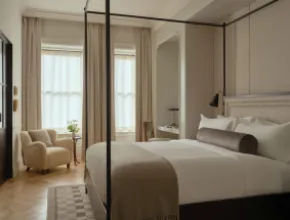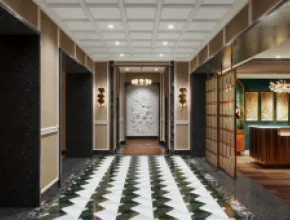Destination Hotels, a collection of luxury and upscale independent hotels, resorts and residences across the U.S., now part of Two Roads Hospitality, released key findings on 2017 meetings trends from its fifth annual “State of the Meetings Industry” survey. By analyzing the responses of more than 400 planners, Destination Hotels has gleaned trends about how planning duties and meetings are changing for 2017.
The following is a summary of the most significant survey results, in addition to related insight and best practices from meetings-focused executives within Destination Hotels. Note that a mix of corporate, association, government and independent planners made up the 400+ total planners surveyed*.
- Making Teambuilding More Effective: As more Millennials become meeting attendees, planners are looking for more active options for teambuilding events. Nearly 60 percent of respondents said they are most interested in adventure/active teambuilding exercises, with another 37 percent of planners citing community service as a highly-desired teambuilding option.
- Attendees Extend Their Stay for Enjoyment: One aspect of meetings that’s changed noticeably in the past 12 months is the number of attendees extending their stay at the host property for leisure purposes. Last year, 61 percent of planners said that more than 1 out of 10 of their attendees either arrived at the property before the meeting, or stayed on property after.
- Maximum Impact from Property Space: Nearly 73 percent of planners voiced that flexible space configurations rated an 8, 9 or 10 in importance to them when choosing a property, emphasizing the importance of multifunction space and the crucial role it plays in meeting planner’s decision making. It’s clear that planners want to make use of as many spaces as possible at the host property for business sessions, as well as social events.
- Importance of Technology at Every Stage of a Meeting: More than 58 percent of planners ranked on-site technology an 8, 9 or 10 in importance to them. Survey respondents confirmed that technology is also making a positive impact on their site-selection experience. Nearly 72 percent of planners said that a property’s website is where they get the most information.
- Food and Beverage Options: Last year’s sentiments were echoed in this year’s survey, citing that F&B pricing was again the third-most critical factor for planners when selecting a property, after location and room rate. The importance of F&B options to planners remained constant.
- Collaboration and Creativity to Stay in Budget: Respondents demonstrated they have more money to spend on meetings in 2017 but will spend it across more meetings, rather than more money to spend per meeting. With survey respondents saying that location and rate are at the foremost of consideration when choosing a meeting venue, flexibility also plays a vital role for planners who often need to shift dates in one or two weeks in either direction.
*Survey Methodology: In October 2016, Destination Hotels contacted 23,819 corporate, association, government and independent meeting planners, of which 405 responded to the survey.





